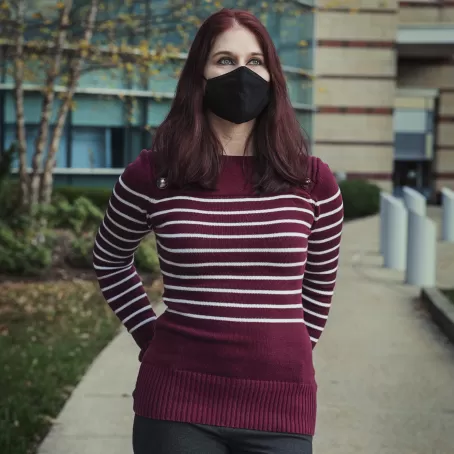The medicines that we rely on exist because of the dedication of clinical trial participants. And it’s up to Amanda Dunlap and the PCRU recruitment team to find those participants.
“Here at the PCRU, we’re mostly phase 1 studies, especially first-in-human,” she says. “So, we’re mostly looking for healthy volunteers.”
Recruiting these volunteers involves a lot of communication and strategy, from developing advertising materials, to managing the PCRU’s internal database of past participants, to making phone calls.
Each trial is unique, Amanda says, in terms of how many participants are needed and how long they’ll stay on-site at the PCRU. Typically, the PCRU recruitment team has about a month of lead time - plenty of time to find the number of qualified participants the study requires.
But of course, the pandemic changed everything.
The PCRU was selected as the site to test a potential new medicine against COVID-19. The urgency of this work meant that Pfizer and the PCRU team would concentrate every resource possible on these studies and conduct them with a speed and efficiency unprecedented in the history of pharmacological development.
“It was a lot of stress, but the kind that gets you motivated and on your game.”
“This was what they called a “Lightspeed Study,” Amanda says. “It was the one of the first times we’d heard that term, and it was different from previous studies in every way you could imagine.”
One of those differences was the large number of participants the study would require. It would be up to Amanda’s team to recruit those participants. But instead of months, they’d have only weeks to do it.
And then they’d need to do it again, and again, as Pfizer scientists discovered more and more about the investigational compound and requested more data and therefore more volunteers.
“It was maybe four times the usual workload, and it never stopped,” Amanda remembers. “Just months and months of amazing work and incredible collaboration.”
As the pandemic raged across the world, Amanda and the recruitment team quickly discovered that this resolve was felt by potential trial participants, too.
“They really wanted to help,” Amanda says. “People would tell the staff on the phone, ‘I lost a loved one to COVID, this is personal to me.’ They wanted to be actively making a difference.”
“And that was powerful and inspiring for us, to know that what you were doing was so important, and to realize the real impact that we could have. I think it really brought out the best in people.”
As the work intensified, Amanda found herself drawing on long-buried skills and interests - an eclectic range of talents that suddenly fit perfectly with the demands of her job.
“When I was younger, I fully intended to become a therapist,” Amanda says. In college she had funneled her passion for research, psychology, and lab work into a master’s degree in Neuroscience. Along the way she also discovered a talent for design and communications.
“As it turns out, all of those skills added up to be perfect for exactly this job at exactly this moment,” Amanda says. “I like figuring out how to connect with people, and then applying that to helping even more people. And during the COVID trial, this job required all of that, 100 percent.”
Ultimately, Amanda and the rest of the PCRU recruitment team successfully completed enrollment for the phase 1 study.
“To be able to take all your experience and interests and talents and apply them to something that might help people around the world - that’s so powerful,” Amanda says. “We did it together, as a team. And that felt so good.”
